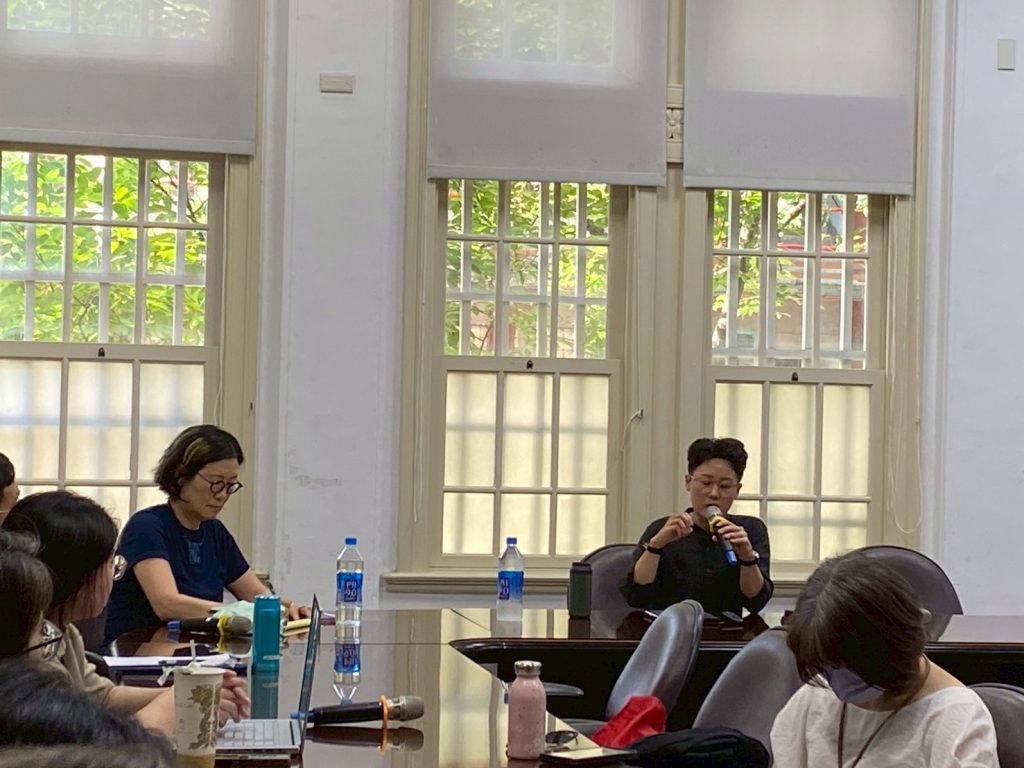This summer, the International Taiwan Studies Center at NTNU was pleased to co-organize a series of lectures on “Theory and Methodology of Taiwan Studies” (台灣研究理論與方法) with Yushan Scholar Professor Shih Shu-mei (史書美) of UCLA.
Liu Wen (劉文), an associate professor at the Academia Sinica Institute of Ethnology, was the fourth speaker of this lecture series. On the afternoon of July 15th, she delivered a lecture titled “亞裔美國研究能為台灣研究做社麼?重新思考種族、國族與區域 (What Can Asian American Studies Bring to Taiwan Studies? Reconsidering Race, Nationality, and Region)”. To assist the two fields in better meshing together, Professor Liu presented a parallel comparison of the histories of both Asian American studies and Taiwan Studies across these three concepts.
Professor Liu began with a brief history of “Asian American” as an ethnicity, and gave an overview of the main approaches for research into Asian American identity, including her own focus of Asian settler colonialism, which examines Asian (American) participation in settler colonialist projects.
Professor Liu argues that the broader identity of Asian American is maintained through a narrative of continuous racial repression. In Feeling Asian American: Racial Flexibility between Assimilation and Oppression, Liu writes that “To feel Asian American is to sense a collectivized history of racial injury, despite its categorical internal demographic and ideological heterogeneities.”
In discussing region and nationality, Professor Liu went on to explain how the fields of Asian American studies and Taiwan Studies have regarded each other and evolved, especially in response to the end of the Cold War, globalization, and protectionism—all factors in why modern Asian American studies tends to see Taiwan as a retrograde counterpart to a romanticized socialist China.
Professor Liu closed with an assessment of what the two fields of Asian American studies and Taiwan Studies can offer one another, and how they can address each other’s blind spots: Asian American studies can broaden the scope of research and refine the narrative of Taiwan from pure victim to a union of identities; Taiwan Studies can prevent the romanticization of Chinese nationalism, highlight interactions between ethnicity and geopolitics, and give voice to Sinophone critiques of China and imperialism.
The lecture was followed by a Q&A session, which included discussions of research into pro-China NGOs such as the Qiao Collective, racial capitalism, the Sinophone left, and the difficulties in studying the hierarchies and divisions within “Asian American.”
Given the success of the summer’s lecture series, Professor Shih will be holding another series on “Taiwan and Sinophone Studies across Disciplines” (跨學科的台灣與華語語系研究) in December this year, featuring guest speakers Alvin Wong, Howard Chiang (姜學豪), Chen Ruey-lin (陳瑞麟), and Nishi Masahiko (西成彦). More information here!
